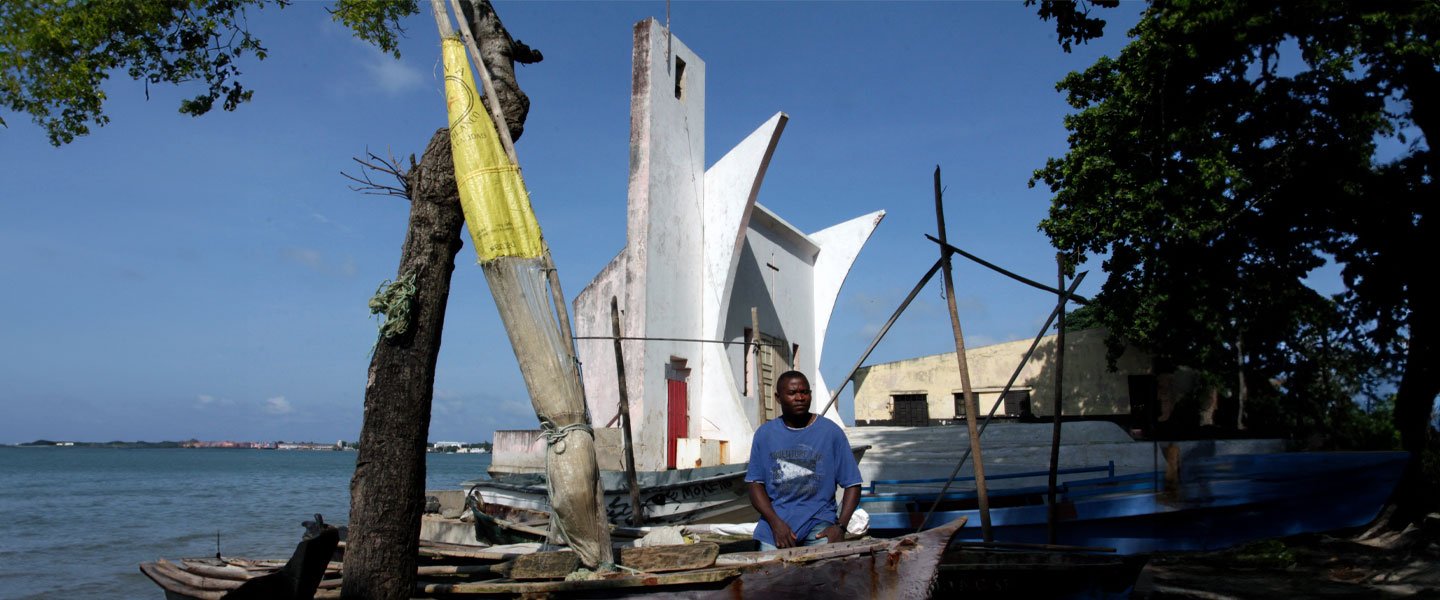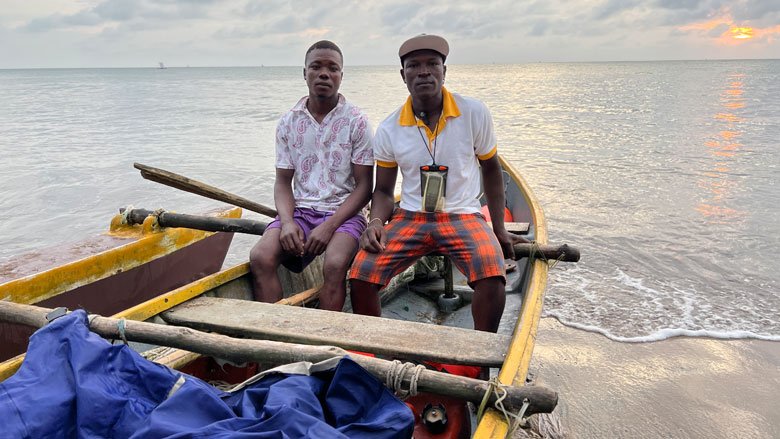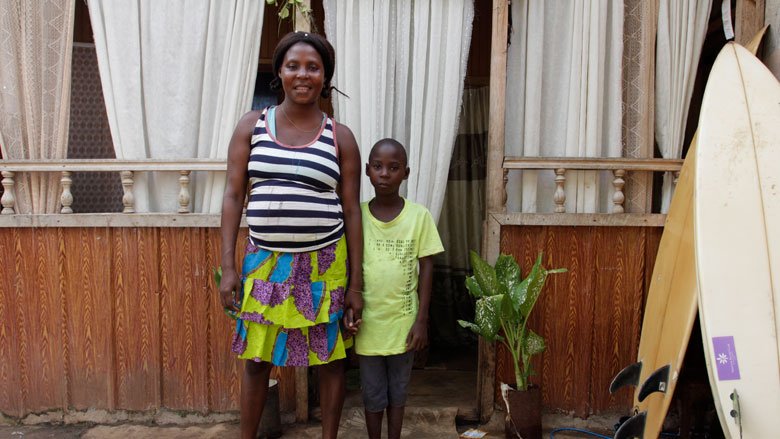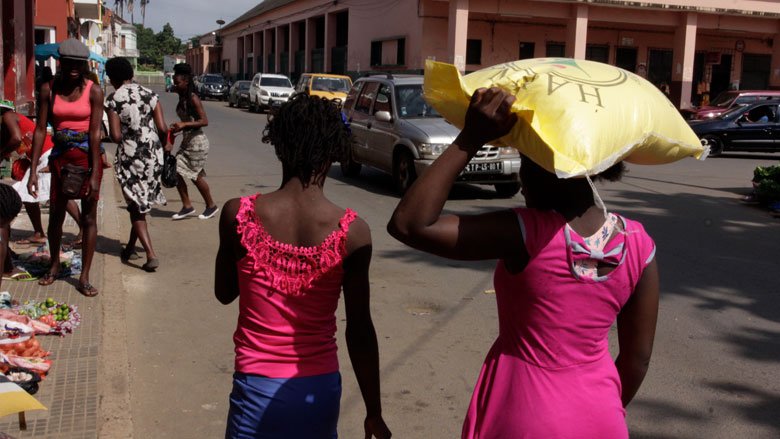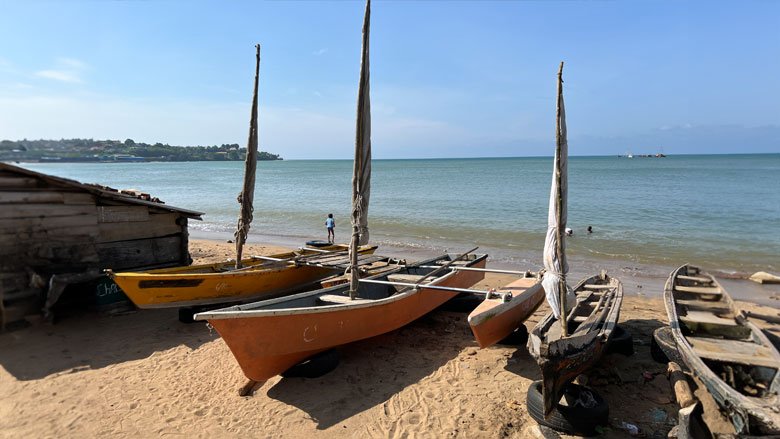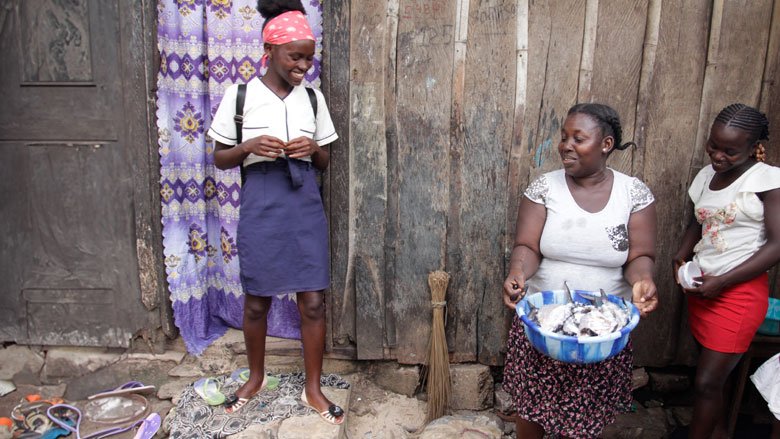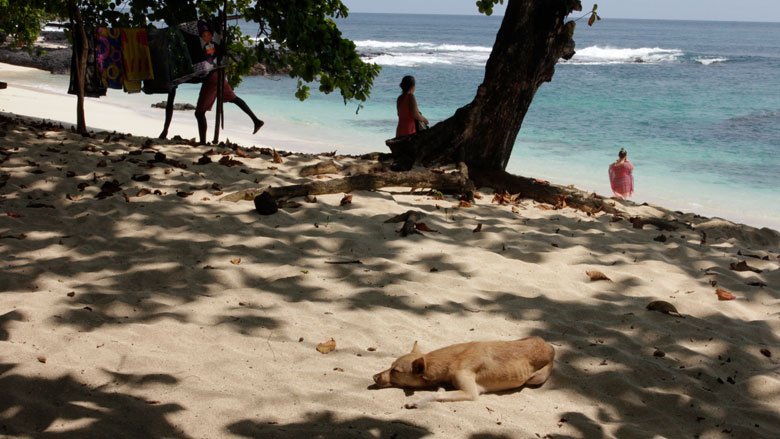- Islanders in S?o Tom¨¦ and Pr¨ªncipe face multiple challenges, from climate change, which is increasing flooding and coastal erosion, to COVID-19, which hurt the tropical islands¡¯ tourism industry, and now financial difficulties linked to rising fuel and food costs.
- Like the rocky structures that dampen the force of crushing waves, two IDA-financed projects are making a tangible difference in people¡¯s lives by increasing their ability to cope today and plan for a better tomorrow.
Every January, about 60 small fishing boats head out from the main beach of the town of S?o Tom¨¦, the capital of S?o Tom¨¦ and Pr¨ªncipe, a small island state in the Gulf of Guinea, off the west coast of Africa. A priest at the head of the maritime procession carries the image of Saint Peter, the fisherman and apostle, to invoke the miraculous catch described in the Bible and ask for Saint Peter¡¯s protection.
In May, it¡¯s the turn of the fishers of Neves, a town on the northwest coast of S?o Tom¨¦, to ward off bad luck and officially open the flying fish season by throwing their first catch up in the air when they return to shore, for people to share and eat.
But year-round, the protection that fishers depend on the most is certainly their Global Positioning System (GPS). ¡°It¡¯s my god,¡± affirmed categorically C¨¦lcio Dias ¨C known as Mano. A 30-year-old fisherman from Praia Mel?o in the suburbs of S?o Tom¨¦, Mano explained: ¡°From the beach, the sea may look friendly but when you sail in deep waters it¡¯s dangerous and scary. There are sharks, even whales. It¡¯s easy to lose sight of the land. When I started fishing, I did not have a GPS. I lost many friends. Some got lost, some drifted to foreign countries, and some died. Now that I have a GPS, my family is much less worried.¡±
Safety-at-sea kits that include GPS, sealed pockets to protect electronics, lifejackets and training, have been distributed to about 3,000 fishers (out of an estimated 4,125 fishers) under successive World Bank projects. The kits are part of a broad menu of interventions that are helping build greater resilience and reduce poverty in the small island state of S?o Tom¨¦ and Pr¨ªncipe (STP). About 223,000 people live on the archipelago and about 15.4% of the population falls under the international poverty line.
Physical investments, financed by the International Development Association (IDA) under the multi-donor managed by the World Bank, focus on 12 artisanal fishing communities on the islands of S?o Tom¨¦ and Pr¨ªncipe. These include investments in breakwaters, seawalls, road rehabilitation, boat ramps and new, safer housing for people exposed to storm surges and rising tides. Eleven lighthouses that had fallen in disrepair were renovated and equipped with more long-lasting, solar-powered technology. New recreational, sanitary, and educational facilities are being built at the communities¡¯ request to complement the investments in coastal infrastructure. Together, these assets create a safer and cleaner living environment for fishing communities.
But the social impact of these investments may be much broader. ¡°90% of our animal protein comes from fish. In our society, the men fish and the women sell fish. So, protecting the lives and livelihoods associated with fishing is essential. It helps preserve many families,¡± said Arlindo Carvalho, Technical Coordinator at the Ministry of Infrastructures, Natural Resources and the Environment, which is implementing the WACA project in STP.
As overfishing and oceanic changes have reduced fishing stocks close to S?o Tom¨¦, fishers have had to push their luck further from the coast in perilous wooden canoes and small fiberglass boats. On a recent morning, for example, Mano and his fishing mate were loading 75 liters of gasoline, preparing to go 45 or 50 miles, well beyond the range of lighthouses and the familiar outline of S?o Tom¨¦. The information provided by a GPS is critical for fishermen to return safely home. Since safety kits were rolled out and lighthouses renovated, the number of yearly casualties has gone down, said Carvalho.
¡°WACA¡¯s work helps us too,¡± said Nuria Rita Ferreira de Ceita, the Director of the Social Protection, Solidarity and Family Directorate that is implementing an IDA-financed social protection project. ¡°If coastal communities are doing well, it lowers the demand for our services.¡±
A few houses from where Mano lives and keeps his motor, Ermelita Martins knows first-hand that the loss of a breadwinner can put a whole family off-course. Her second husband was a fisherman and contributed to raising six children. But when he suffered a major stroke, Ermelita was on her own. She coped for a while by taking in people¡¯s laundry and selling fish in the street. But when she also fell sick and could no longer pay about $25 a year in enrollment fees, she stopped sending her children to school. Access to social protection payments helped her family get a second chance.
Started in 2019, S?o Tom¨¦ and Pr¨ªncipe¡¯s Family Program has evolved over time to respond to a variety of needs. At its core, it provides bi-monthly cash transfers to about 2,500 vulnerable mothers like Ermelita, on the condition that they keep their kids in school. ¡°Education is important because kids will be the leaders of the country in the future. When children, including the children of fishermen, go to school, it opens more options,¡± said de Ceita.
When COVID-19 lockdowns hit STP, paralyzing tourism and shrinking business hours, the program was vastly scaled up to provide temporary emergency support for an additional 14,000 people. These included people who were sick, laid-off workers in the tourism industry, elderly people, and other vulnerable people on the program¡¯s waiting list.
The next wave of need may be triggered by successive shocks linked to higher food and fuel prices. The introduction of a 15% Value Added Tax regime on June 1, 2023, designed to improve domestic revenue collection, is leading to price pressures. Despite the introduction of mitigation measures to protect the most vulnerable, such as taxing basic foodstuffs at a lower rate, ¡°there is a snowball effect,¡± said de Ceita. ¡°Even informal vendors will need to raise their prices to compensate for the more expensive goods they buy in shops. We already receive daily requests for help with food and medicine and we expect the situation to worsen,¡± she said. The Family Program¡¯s planned expansion from 2,500 to 4,500 households is expected to protect some of the poorest families from the impact of rising prices. With support from the UN International Labor Organization, STP authorities are also constituting a single social registry which will help them adapt to new demands.
Hardship is not new to people in S?o Tom¨¦ and Pr¨ªncipe. The island country gained its independence from Portugal in 1975 and struggled to undo the legacy of large colonial cocoa and coffee-producing plantations (known as ) that were built on centralized and often harsh exploitation of labor. A model built on state-owned enterprises also failed in the 1990s. The economy today is built on a mix of agriculture, fishing, trade, and tourism.
In Porto Alegre, a coastal community in the southern district of S?o Tom¨¦ island, where volcanic peaks and a vast oil palm plantation yield to sandy beaches and a handful of hotels, villagers shared their tricks for getting by.
For Cesaltina de Sousa, a 42-year-old mother of eight children, investing in resilience means salting and drying fish so that it doesn¡¯t spoil. Although salt-cured fish is typically sold for less money than fresh fish, she can sell everything she purchases from fishermen and not worry about losses. Business training that she received under the Family Program¡¯s skills development course taught her to always set aside enough money to renew her stock, even in lean seasons when fish and money are scarce. ¡°Don¡¯t squander your capital,¡± she said, ¡°even when things aren¡¯t going well. Don¡¯t eat your stock in trade.¡± All her children go to school with the help of the Family Program: the eldest is studying law in the capital; another daughter wants to be a doctor.
For her neighbor Apolinario da Costa, there is strength in economic diversification. ¡°When there are no fish, I take care of tourists; and when there are no tourists, I fish,¡± said the 52-year-old father of five. With lifejackets on hand and a steady stream of anecdotes, he easily converts his fishing boat into a 20-minute cruise that shuttles tourists from Porto Alegre to a small island called Ilheu das Rolas. The island is famous for its pristine beaches and sea turtles, as well as a historical marker that indicates the exact position of the Equator Line. Although the island¡¯s only hotel has been shut indefinitely for maintenance, these natural and geographical assets are enough to draw a trickle of day-trippers.
The fisherman/ tour guide estimates that STP has much to gain from the return of tourists after the crisis years of COVID-19. ¡°Three people can easily spend 100 Euros a day here, on boat tours, food and guides ¨C without even factoring in accommodations,¡± said da Costa. ¡°It¡¯s money that goes straight to the community.¡±
The tourism sector accounted for 6.3% of GDP in 2018, dropped to 4.8% in 2020, and appears to be rebounding: the number of tourist arrivals in 2022 almost doubled, reaching 26,257 compared to 15,101 people in 2021. But further investments in coastal protection, hospitality, and travel infrastructure are urgently needed to keep tourists interested in trekking to this remote archipelago. According to Carvalho, WACA¡¯s technical coordinator, plans are underway to integrate sustainable tourism in the project¡¯s next phase, WACA+, expected in 2024. If so, it would help move coastal communities from a state of hard work and survival to one of greater development and hope for the future.
